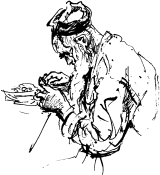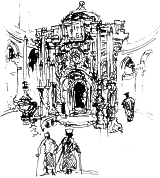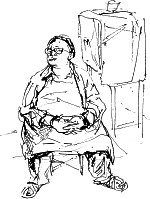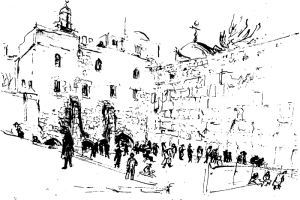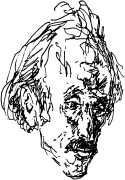April 25, 1977
Israel starts, of course, at London Airport, even if you don’t fly El Al. “Any special meal. Madam?” a British Airways hostess tactfully asked at the last check-in point. My wife didn’t understand – and thought that she would now be offered a choice of menu, so I quickly intervened: “She means kosher.”
The departure lounge, some of it, in terms of faces, expressions, clothing, age (I mean youth), was not unlike my first day in prison in 1938. You might think, those orthodox youths were less relaxed then, less loquacious – but you’d be wrong. Or you might think, they must have prayed there, fussily. Indeed they did – but so they did in the departure lounge, against a (symbolically wailing) wall, with jokes inevitably following as dessert. Actually, it was the wall with the telephones on it: any implication that one might get through to God more easily that way? In any case, hectic phone conversations soon followed: it looked as if the whole world was being rung, family and business.
In the plane itself, two young orthodox Jews diagonally in front of us (so we could watch them closely), after protracted inspection of the different items of food, mutual consultation and silent cogitation, refused the kosher food provided – in case it wasn’t kosher enough: maybe our Chief Rabbi’s imprimatur was missing from the Hebrew label. But there wasn’t total agreement either: one of the youths refused the tea too – or rather didn’t drink it after he had accepted it; the other drank it. They both got jolly hungry in the process (our lunch was served at 3 p.m.), and dug into some biscuits they had in their bags. One removed his hat before lunch, leaving only the skull cap; now after no lunch, he put his hat on again, confirming his emotional distance.
On our first flight to Israel three years ago, on El Al, I regretted that my grandmother wasn’t there to witness events when one of the stewards gave my wife her first Hebrew lesson; this time, grandmother was needed to hear a British Airways stewardess make fluent Hebrew announcements.
Throughout the flight (which took about 7 hours because of the normal Heathrow strike that necessitated our touching down at Frankfurt in order to refuel), the two young men did very little that could be interpreted as contact with the outside world. There was minimal conversation (including a maximum of evidently ironical jokes), both between them and with ambulant orthodox co-travellers; otherwise, sleep and meditation were all that happened. Neither boy read, and each showed no more than the most fleeting interest in his surroundings. The no man’s land between obsessional neurosis and spirituality is hellishly difficult to chart: Kafka the Jew described writing as prayer.
Indeed, with the evening setting in, obsessional neurosis and spirituality once again met in no man’s land, leaving no land in between: it was, of course, time for prayer again – against the wailing wall of the plane’s emergency exit, and the metric (rather than rhythmic) motion of the bodies, some of them relaxedly swaying, others in hectic, almost contorted pursuit of the truth, gave one, without any effort of the imagination, a cross-sectional picture of the psychology of humanity – of Friedrich Schiller’s ‘naive’ and ‘striving’ (sentimentalisch) types, one in natural possession of the revelation he desires, the other perpetually yearning for it and fighting towards it – like, on the level of genius, Mozart and Beethoven, or Bruckner and Mahler, the latter the hectic searcher par excellence.
On the drive to Jerusalem, we learnt that both our driver, skull-capped again, and his wife were Israeli-born, “not guilty,” as he put it. But this stem piece of news was soon mitigated by the additional information that the driver had an aunt in Golders Green, and his wife a cousin in … “in… in… what's the other Jewish district?” “East End?” “No.” “Whitechapel?” “No.” “Hendon?” “Yes! Hendon.” And before we knew where we were (in fact, we had only just left the outer ranges of Tel Aviv behind us), both Sabras talked both English and German to us, because his mother (an artist) was German, while his father was Lithuanian; and her (a nutritionist’s) mother came from the same town as my wife (Düsseldorf), while her father came from Munich.
I asked about the political situation, the forthcoming elections. His answers did not contain any personal contribution, nor any news. We had been aware that ‘where there are two Jews, there are three opinions,’ and I had publicly used our driver's favourite joke for years, decades:
Two litigating Jews appear before the rabbi. “You are right,” he says to the first, having heard his case. The other puts his. “You are right,” the rabbi says to him, too. “But rabbi,” says the Rebbetsen (rabbi’s wife), “they can’t both be right at the same time!” “And you’re right, too,” the rabbi says to her, leaving no doubt about the psychological wisdom of his illogicality.
see also:
- introduction
- publication details
- illustrated excerpts from the diary
- April 25, 1977: arriving in Israel
- June 3, 1977: concert-hall conventions
- June 22, 1979: a ‘bi-lingual’ state?
- July 2, 1979: the
government of Israel, Menachem Begin and Ariel Sharon.
- the book’s launch
event, 17th October 2001
- Press Release: Royal Philharmonic Society Book of the Year, 2001

